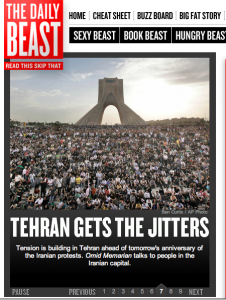 June 10, 2010 | 10:29pm, the Daily Beast
June 10, 2010 | 10:29pm, the Daily Beast
Tension is building in Tehran ahead of Saturday’s anniversary of the Iranian protests. Omid Memarian talks to people in the Iranian capital.
In advance of the one-year anniversary of Iran’s disputed elections on Saturday, the government has sent security forces into the streets of Tehran to prevent another popular uprising. Already, plainclothes police and students have clashed violently, and the government has warned against further protest rallies. Confrontations with women over how to dress, and the execution of five dissidents last month have contributed to tensions in the capital.
When students gathered at the Azad University recently, chanting slogans such as “death to the dictator,” and protesting recent arrests, plainclothes officers swiftly cracked down on the demonstrators, who were beaten, according to reports by people who were there.
“It seems that as we get closer to the anniversary of last year’s elections… confrontations and threats intensify.”
A few days later, the police commander of greater Tehran, General Hossein Sajedinia, told an official news agency that police forces would not hesitate to confront illegal demonstrations.
“The government is ready for a crackdown,” a journalist in Tehran told The Daily Beast on condition of anonymity, noting that police are now omnipresent in the city. He added that, as a result, residents are visibly nervous. “Everyone is asking each other whether there will be demonstrations.”
This week, the government turned down formal requests for demonstration permits by Mir-Hossein Mousavi and Mehdi Karroubi, both candidates in last year’s elections, despite promises that there would be no speeches or statements made at the rally. On Thursday, fearing a brutal crackdown on what would be an “illegal” protest, the opposition leaders called for people to stay home this weekend.
“Given the horrible atrocities that took place over the past year …we are asking people to save lives and property, to seek their demands through less costly means,” the opposition leaders said in a statement.
“I think it’s obvious why the authorities do not wish to issue the permit,” Mehdi Karroubi’s son and spokesman, Hossein, told The Daily Beast. The government can only mobilize between 200,000 and 300,000 people as counterdemonstrators, and election protesters in Tehran would number in the millions, if a permit was issued, Hossein Karroubi said.
Last year, after elections that were roundly criticized for being fraudulent, millions of people protested in the streets, leading to a brutal government crackdown that left at least 48 people dead, hundreds injured, and thousands detained. Hundreds of those arrested received severe prison sentences for participating in the street protests.
Previously, the government has arrested journalists, expelled foreign reporters, closed down newspapers, interfered with Internet service, and disrupted cellphone services to control the free flow of information, and people fear that the government will resort to similar tactics around the anniversary of the elections this weekend.
“It seems that as we get closer to the anniversary of last year’s elections… confrontations and threats intensify,” said Faezeh Hashemi, a former member of the parliament and daughter of former president, Ali Akbar Hashemi Rafsanjani, according to the reformist website JARAS. “Instead of spending so much force, money, resources, energy and the country’s very reputation on suppression,” she said, the government should “accept some of the proposed solutions for getting out of the existing situation.”
Given the government crackdown, people are expressing reluctance about taking part in any demonstrations over the weekend. A 24-year-old university student in Tehran told The Daily Beast by telephone that many students are having second thoughts about participating in protests.
“The street protests can no longer be justified, because when we participate in protests, we run the risk of never returning home, or going to prison,” said the student, who preferred to remain anonymous. “This is a very high price to pay.”
Saba Vasefi, a women’s rights activist, said Iranians have other concerns, such as economic hardship, that may trump the issue of political freedom. “I believe the masses aren’t prepared to pay [the price when] they can’t imagine a clear outcome.”
Omid Memarian is columnist whose writing has appeared in The New York Times, the Los Angeles Times, the San Francisco Chronicle and other publications. He was a World Peace Fellow at the UC Berkeley Graduate School of Journalism in 2007-2009 and the 2005 recipient of the Human Rights Defender Award, the highest honor bestowed by Human Rights Watch.
